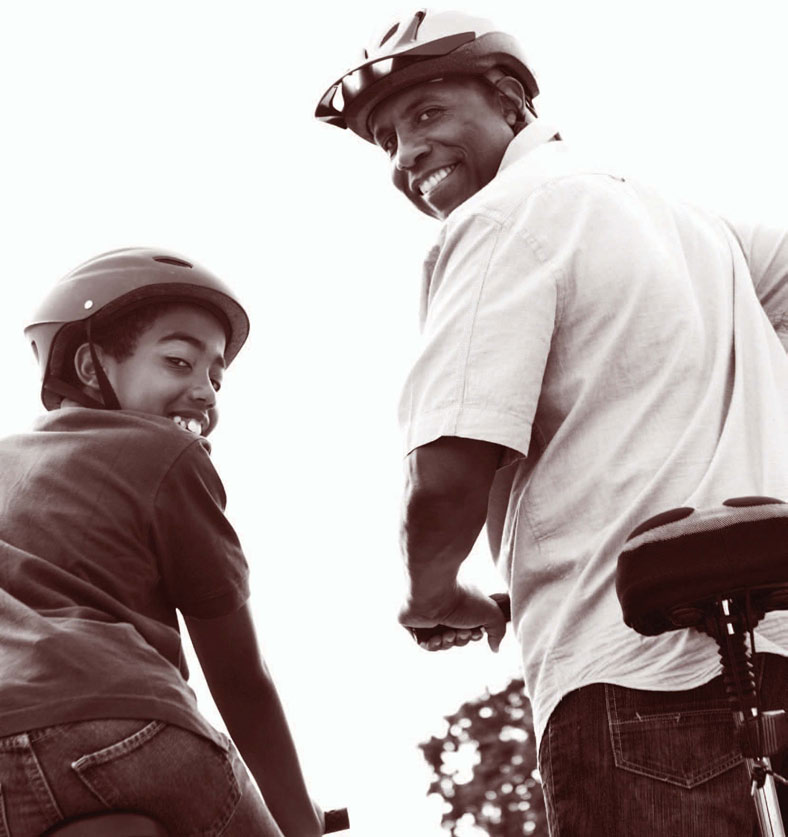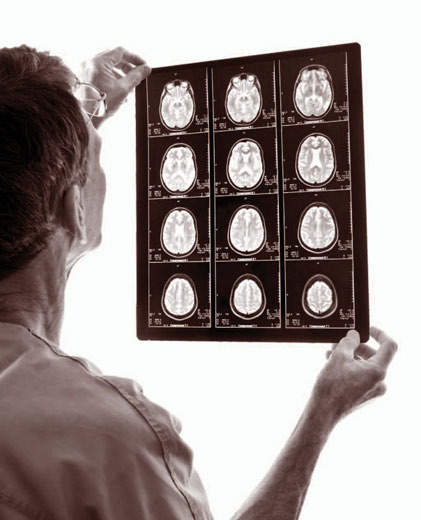interested in, and it provides you
It may seem premature to talk about
businesses, healthcare providers,
insight into their world.
drugs with preschoolers, but the
law enforcement, and faith-based
These casual conversations don’t have
attitudes they form now are the
institutions to share ideas, problems,
to be long and drawn out, but they
foundation for the decisions they will
and solutions that are unique to a
are an excellent time to introduce the
particular community.
make when they’re older. Talk often
subject of drugs and alcohol. Don’t
with your preschoolers, and listen
Be A gooD role MoDel
worry that you are giving your child
often to what they have to say.
ideas. Kids are exposed to alcohol and
As previously mentioned, children
1. playing grownup. At this early
drugs through the media every day.
learn what they see. This means
age, children often like to play
Even elementary school children likely
that many of their attitudes about
grownup by pretending to be
substance abuse will be shaped by
know someone who uses prescription
adults. They mimic what adults
your attitudes and your actions. If
drugs for allergies or asthma. If not,
do and say. What they hear you
you occasionally drink alcohol, do
they probably remember having a cold
say and see you do makes a lasting
so in moderation, and never imply
and being given medicine to make
impression, so when opportunities
that alcohol is a good way to handle
them feel better.
arise to let your child know how
problems. Instead, show your child
noTe: The following text suggests
you feel about substance use, share
how to use healthy ways to cope with
ways to talk with children at various
those feelings. If you drive up to
stress, such as exercising, listening to
ages. Although divided into preschool,
the supermarket, for example,
music, or talking your issues over with elementary, middle school, and high and see someone standing outside
a friend.
school, the exact age range of students
smoking, tell your child that
smoking is harmful and that it
coMMUnicATe no
in these grade levels may be different in
causes people to get very sick and
TolerAnce For
your area. Also, children don’t necessarily
develop at the same pace, and drug
sometimes die.
SUBSTAnce USe
issues vary among communities. Use the
2. Teaching on their level.
As a parent, you can have more
suggestions most suitable to your child’s
Children this age are capable of
influence over your child’s behavior
maturity level and environment.
understanding your explanation
than his friends do, and more
influence than music, TV, social
networking sites, and celebrities.
As mentioned previously, make it
perfectly clear that you do not want
your child to use tobacco, alcohol,
or drugs. Period. Stress that it is
unhealthy and it is illegal.
TAlK WiTH YoUr
cHilDren ABoUT DrUgS
Parents of very young children must
quickly learn to answer a lot of
questions—no matter how ridiculous
they seem. Taking time to do so
lets kids know that it’s okay to ask
questions and that you can be trusted
to provide answers. Children don’t
forget this! As they grow, your own
willingness to ask questions and to
be a good listener is also important.
It tells children you care about what
Growin
Gro
G
win uP
uP d
ru
d
G Free: A P
A A
P rent’s Guide t
A
o Prevention
rent’s Guide t
29
sECtION 4
important to teach your children
Dos AnD Don’Ts oF TAlKing WiTH KiDS
how to make good decisions. One
ABoUT DrUgS
way to do that is to let your chil-
dren make their own decisions—
when it comes to talking with kids at any age, make your messages clear
but only if they don’t endanger
and consistent.
their well-being. For example:
Do:
❯
Explain early (and often)
y tell them the dangers of using drugs and alcohol using age-appropriate about why healthy foods help
explanations.
children grow up to be fit
y explain why you don’t want them to use drugs. For example, explain how and strong. If they are espe-drugs and alcohol interfere with young people’s concentration, memory,
cially enamored by a fictional
and motor skills, and that it leads to poorer school performance. tell them
character or famous athlete,
you wouldn’t want these outcomes for them.
encourage them to eat healthy
foods so they will grow up to
y Make it easy for your child to talk honestly with you. Also, make yourself be healthy and strong like thier
available when your child wants to talk—no matter the time of day or the
idols. This gives your child
other tasks you face.
the background knowledge to
y Believe in your own power to help your child avoid using alcohol and drugs.
make smart food choices.
Don’T:
❯ When feasible, let your pre-
y don’t react in anger—even if your child makes statements that shock you.
schooler choose what cloth-
ing to wear—even if they
y don’t expect every conversation to be perfect. they won’t be.
make a few mistakes. Letting
y don’t simply demand that your children not do drugs. instead, educate them them choose builds confi-about the risks so they will be equipped to make decisions about drug use
dence in their own decision-
based on their own knowledge.
making ability.
y don’t talk without listening. Aim for a 50/50 conversation—you talk half
Talking With Elementary
the time and listen the other half.
School Students (6–10
y don’t make stuff up. if your child asks a question you can’t answer or wants
years old)
information about something you’re unsure of, promise to find the correct
answer so you can learn together. then follow up on that promise.
At the lower end of this age range,
children are very perceptive and
anxious to learn. This is a good time
about poison and bad things
When they ask questions, answer
to introduce more detail into your
in your home, such as cleaning
honestly but don’t overwhelm
conversations about drugs, especially
products, paint, etc. Caution your
them with information they aren’t
what they are and the consequences
children to eat or drink only what
capable of understanding. For
of using them. Explain the concept of
you, a grandparent, or another
example, you or another adult
addiction—that some people may not
caregiver gives them. If your child
family member occasionally drink
understand how harmful drugs are or
becomes sick and you administer
wine with dinner or enjoy a beer
that some people try drugs and then
medicine, use this opportunity
on the weekend. Four-year-old
have a hard time quitting. Introduce
to explain that medicine helps
Jimmy wants to know if he can
them to the idea that drug use can lead
the person it is meant for but can
taste it. You might say, “No, Jimmy, to abuse, which can lead to addiction.
harm someone else who takes
this is only for adults who are at least
1. good drugs and bad drugs.
it. Warn children to never take a
21 years old. It can make children
Kids in this age group may ask
drug unless it is meant for them.
very sick if they drink it. Why don’t
why some drugs are good for you
3. Short but honest answers.
you help me fix you a glass of apple
and others aren’t. With the rise in
Preschool children are curious and
juice instead?”
prescription drug abuse, this is a
eager to learn, but they also have
4. Decisions, decisions … Even
good time to explain to them that
relatively short attention spans.
at this early stage of life, it’s
prescription medication should be
30
U.S. Dr
U
U
.S. Dr g Enf
U
orc
g Enf
E
orc mE
m nt ADmini
D
S
mini tr
S
Ation • U
A
.S. D
tion • U
E
.S. D p
E A
p r
A tm
r
Ent of EDU
nt of E
cA
c tion
A



HoW Do WHA
i Te T SUBS
AcH MY TA
c nce
Hil S D
D AB o KiDS US
UT DrU e
g ?
S
taken only when a doctor tells you
to and only when administered
by an adult. Tell your child that
bad drugs can make you sick or
even kill you and that is why it is
wrong to take them—even once.
They may even understand the
sadness that accompanies death if
they’ve lost a loved one (such as a
grandparent).
2. Honesty and praise. Explain
in more detail how dangerous it
is for children to drink alcohol
and how harmful it is to their
developing brain and body. Tell
them the truth: even relatively
small amounts of alcohol can make
a child sick. If your children aspire
to be like someone famous, such as
a sports figure, remind them that
it’s important to take care of their
body and not use tobacco, alcohol,
or drugs if they want to excel.
Children this age crave praise, so
give it out freely when deserved.
For example, let them know you
think they are super smart for
Talk to your kids often about making
disliking the smell of cigarette
smoke. This type of interaction also
good choices and about healthy
assures children they are capable
of making healthy choices—in this
living and smart goal setting.
case, they dislike cigarettes and
don’t want to be around them.
3. repeat yourself. While in
converSATion STArTerS
elementary school, children need
to be warned about not using
starting a conversation about alcohol, tobacco, and other drugs with
inhalants. (For a review, see the
your kids is never easy—but it’s also not as difficult as you may think. take section on inhalants.) Tell them—
advantage of teachable moments to begin a conversation with your child
repeatedly—that even one instance
when the opportunity arises.
of inhaling can lead to severe brain
y if you see a young person smoking a cigarette, you might talk about the
damage or even death.
negative effects of tobacco.
4. When they ask … When
y if you see an interesting news story, discuss it with your child. did a drunk children in this age group ask
driver hit and kill a family? did a young couple lose custody of their chil-
questions, it’s often because of
dren because they were busted for drugs? How does your child feel about
something they have seen or
what happened? what consequences does your child think are appropri-
heard, and it’s important to know
ate in these cases?
where they are getting their
y while watching tv with your kids, ask them if they think the shows or the
information. For example, your
advertising make tobacco, alcohol, and drug use look cool? do they change
eight-year-old may ask, “What is
the way your child feels about drugs?
pot?” First, clarify that your child
Growin
Gro
G
win uP
uP d
ru
d
G Free: A P
A A
P rent’s Guide t
A
o Prevention
rent’s Guide t
31

sECtION 4
means marijuana by asking where
it’s not too late to start! In fact, this
HoW AlcoHol AnD
your child learned about it and
is the time when you should spend
DrUgS AlTer BrAin
what exactly was heard, read, or
even more time talking and listening,
DevelopMenT AnD
seen. Based on that, you might
as your child is likely seeing more
answer, “It’s a very dangerous drug
FUncTion
substance use on television, in
that people smoke—usually like a
movies, and online—and at school
Most kids grow dramatically during
cigarette but sometimes in a pipe.
or in social situations. Children
the adolescent and teen years.
Marijuana has chemicals in it that
this age are capable of engaging in
their young brains, particularly the
can cause cancer and maybe even kill
more in-depth conversations about
prefrontal cortex that is used to
you. People who smoke marijuana
why people use drugs, the potential
make decisions, are growing and
can get addicted and can’t stop
dangers (such as addiction or fatal
developing, too—even into their
using it, or they might try other very
overdose), and the consequences for
twenties! Alcohol can interfere
dangerous drugs, too. It’s nothing
the user and his family.
with some of the developmental
to mess around with, and I hope you
1. Take the lead. Your child may
processes occurring in the brain.
don’t ever try it. You are a smart girl,
not initiate as many conversations
For weeks or months after a teen
and I wouldn’t want you to mess up
about drugs and alcohol with
stops drinking heavily, parts of the
your life.”
you as before. If that’s the case,
brain still struggle to work correctly.66
5. involve others. Children
it’s important for you to take the
drinking at a young age is also
this age still respect adults,
lead and engage your child in
associated with the development of
particularly law enforcement.
discussions at every opportunity
alcohol dependence later in life.
As your child enters elementary
by using real-life events in the
Long-term drug use causes brain
school, offer to help establish
news or in your own lives. For
changes that can set people up for
or administer a drug education
example, your child tells you
addiction and other problems. once
program that includes outside
that a friend named Kevin rode
young people become addicted,
resources. For more information,
in a vehicle driven by an older
their brain becomes altered so that
review the resources in the back
brother, who was smoking
drugs are now their top priority—
of this publication.
marijuana while driving. Explain
and they will compulsively seek and
to your child the importance of
6. encourage healthy choices
use drugs even though doing so
not riding in a car with someone
and smart decision-making.
brings devastating consequences
who is using alcohol or drugs,
Talk to your kids often about
for their lives and for those who
making good choices and about
and explain what to do in that
care about them.
healthy living and smart goal
situation. You might say, “What
setting. Let them make age-
Kevin’s brother did was illegal, and
appropriate decisions, and reward
he could go to jail if caught. But
them when they do well. Doing
more important, he could have had
so empowers them and gives
a serious accident. I hope you know
them confidence in their decision-
you can call me if that ever happens
making skills.
to you, and I will come and get you.
You’ll be driving in a few years, and
Talking With Middle School
I’m glad you are smart enough to
Students (11–14 years old)
know better than to drink or do drugs
and drive.”
Your child’s transition to middle
school (or junior high) calls for
2. encourage healthy growth.
special vigilance. If you began having
Conversations with your child
regular conversations with your
should also include talking about
child at a young age, the child should
his interests. As discussed in the
know by now—without a doubt—
section on protective factors,
where you stand on the subject of
activities such as youth groups,
drugs and alcohol. If you didn’t
arts, music, sports, community
have those conversations earlier,
service, and academic clubs keep
32
U.S. Dr
U
U
.S. Dr g Enforc
g Enf
E
orc mE
m nt ADmini
D
S
mini tr
S
A
tr tion • U
A
.S. D
tion • U
E
.S. D pA
p rtm
r
E
tm nt of E
E
DU
nt of E
cA
c tion
A
HoW Do WHA
i Te T SUBS
AcH MY TA
c nce
Hil S D
D AB o KiDS US
UT DrU e
g ?
S
Your ongoing
USe role-plAYing To Help YoUr cHilD SAY
conversations with
“no” To DrUgS
your children should
encourage your children to analyze a situation and know how to remove
include how to
themselves from a dangerous environment. A great way to prepare your
respond if someone
children for real-life situations is to act out scenarios with them so that
they can practice how they’ll respond. use the following two scenarios as a
offers them drugs or
starting point, and create new ones based on your child’s age and activities.
alcohol. Let your child
Scenario #1: Your child goes to a party at a friend’s house and someone practice his answers.
has brought some beer. Many of the guys there, including older high school
guys, are drinking and they ask your child, “You want some?” take the role
of the older teens or of your child’s friends who casually offer a can of beer children occupied, develop team-to your child.
building skills, provide a sense of
discipline, and sometimes help
Help your child develop firm but friendly responses. Possible answers:
kids discover talents they didn’t
y “no, thanks.”
realize they had. Encourage your
y “no, i’m not into that.”
children to share their dreams—at
the very least,







